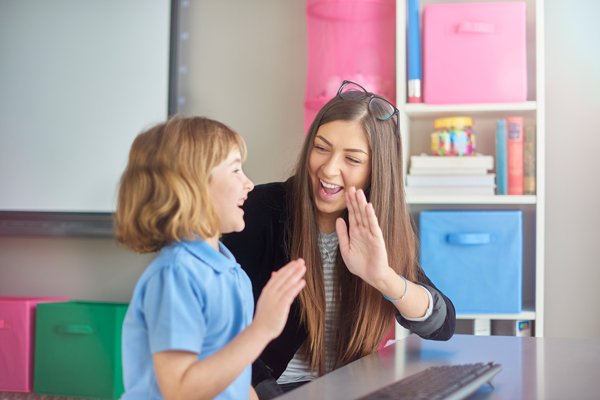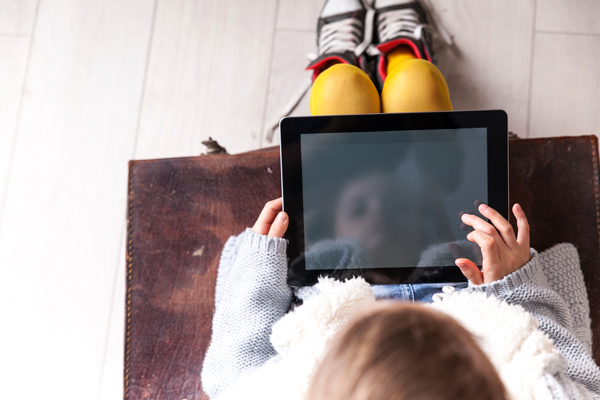Piano teachers are often left feeling undervalued, mistreated, isolated and defeated in the quest of passing on a skill that once gave them joy, pride, purpose and, most importantly, a sense of who they are. I see it in my psychological practice time and time again; to feel passion for what we do we must feel purposeful to someone, and to feel purposeful to someone we need to have a genuine connection with them. Having a sense of purpose is what creates passion for what we do.
If you’re successful in building genuine relationships with your students, two things will happen. First, your students will feel liked by you. They will feel that you are interested in them. When we take a moment to learn who they are and what interests them, they will feel liked and they will like you in return.
Secondly, and most importantly, you will have a greater influence over your students and they will be more motivated to learn. It has been proven that students who feel liked by their teacher and who like them in return will learn more effectively than those who feel disconnected from their teacher.
“In the pressures of today’s educational and occupational lifestyles, parents and their children are often left overworked, overwhelmed, and time poor. This unfortunately has lead to many people approaching their piano lessons with stress, dread and even habitual apathy, which over time can have a monumental impact on the teacher’s working experience. ”
It is this connection, having a positive influence over the way your students feel about lessons and music in general, that gives music teachers a feeling of purpose.
Here are 8 ways that we can help find that connection with our students.
-
Improvise Together.
While piano lessons require the mastery of specific pieces of music, students will find it hard to learn if they don’t find this music emotionally exhilarating. Find out what music makes your student’s heart flutter, head bop, and toes tap and jam it with them! Even if their favourite music plays in the background while you both improvise together for a few minutes at the start of a lesson.
 [separator type=”thin”]
[separator type=”thin”] -
Practice Reflective Listening.
Show interest in your student’s lives outside of piano. Ask questions, listen to their answers and then ask questions about those answers. I understand that this might feel unprofessional for some but as long as your intent remains professional then you will too. In fact the more you learn about the sum of your student’s parts the more you will understand them as a whole. This will not only help you to strengthen the connection you have with them but it will also help you to match your teaching style to their unique and individual needs, helping them to take the most out from each lesson.[separator type=”thin”]
-
Give ‘Missions’ To Complete.
Lets face it, piano practice (aka homework) is often a drag, but necessary for improvement. If their experiences with piano outside of lessons are negative there is minimal chance that they are going to fall in love with the art of playing. In fact they’re much more likely to resist it and then disengage in the process. This is what I believe has the biggest impact on a teacher’s job dissatisfaction; teaching someone who doesn’t want to learn is an exhausting and deflating task.
Give students tasks to complete that are fun, thrilling, and connect to their unique love of music. Some examples of these ‘missions’ include: write your own silly music and I’ll see if I can play it at the beginning of our next lesson; teach mum or dad a simple piece that you know really well and they have to perform it at the beginning of our next lesson; find a song that you love that has ‘X’ sequencing of notes in it; write one verse of your own song and I will create the music for it (you could even do this once a month and by the end of the year you could have created a song together); research the notes of a song and teach it to me at the beginning of our next lesson.
An extra benefit of the ‘missions’ that require your students to teach you or their parents is that teaching reinforces learning. Once your student has taught something to someone they are more likely to understand it and therefore store it to long-term memory. The emotional experience of teaching will also allow them to feel capable and purposeful, which, similarly to you, will ignite a passion for piano.[separator type=”thin”] -
Be Silly (some of the time!).
Of course learning how to play piano requires hard work, concentration and determination but if its all work and no play they simply won’t engage well. Students need to learn when it’s okay to be silly and when it’s important to take things a little more seriously, and piano lessons can give them an opportunity to practice this skill. Choose appropriate times to let your hair down and be silly with them; make jokes (age appropriate, of course!) and refer back to them; use silly hand shakes or high fives that you use to say hello and goodbye with at each lesson; make funny noises together, even mimic a song that they are learning; mirror their non-verbal and verbal language; be loud; be animated; maintain eye contact; and most importantly laugh
 [separator type=”thin”]
[separator type=”thin”] -
Don’t fear The Angry or Withdrawn Teen.
As an adolescent psychologist this is a point that I can make very confidently. Teenagers often appear angry or withdrawn when they are anxious. Their allusive nonverbal language serves as a protective guard for the insecurities they have about how others see them, especially people in authority. Adolescence is such a traumatic experience for developing brain as they try to navigate their way into their adult sense of self, so be assured that the more angry or withdrawn a student may seem the more anxious and insecure they are.
Work especially hard on building a relationship with these very sensitive and often lonely souls. Use their non-verbal language as an indicator for their insecurities and mirror their energy as well as their language. Validate how they may be feeling and empathise with how difficult it must all be at times. Remember that when you give someone permission to feel a certain way you’re not colluding with their belief, but instead allowing them to feel not so alone in their despair.[separator type=”thin”] -
Normalise, Celebrate and Model Mistakes.
Young people are shying away more than ever from activities where they may make a mistake due to the fear of looking ‘stupid’ and being seen as ‘not good enough’. Encourage your students to ask questions, have a go, and make mistakes. If they feel that it’s okay to get it wrong they will keep practicing until they eventually get it right. Another great way to connect to your students in this way is to model healthy mistake mistaking yourself. Make genuine mistakes, acknowledge when you do, laugh about it, highlight that it’s the step that comes right before mastery, and have another go without hesitation. Young people learn how to fail not by listening to their teachers’ words but by watching how their teachers grapple with their own failures.[separator type=”thin”]
-
Celebrate Successes,
No Matter How Small. All of us love to feel like we are doing a good job. Make sure that no matter how small the success is acknowledge it to your students. Feeling like they are doing something well will help them to stay engaged in the task and will improve their productivity. A really good way to provide this is to set small, achievable goals for each student. This way they can measure their progression regularly, which will keep them motivated to learn. Celebrate loudly and enthusiastically when they achieve these goals and reinforce that it was their hard work, persistence, and exposure to mistake making that got them there.[separator type=”thin”]
-
Let Your Passion Show.
Emotion is contagious! The final and most influential step to help you connect to your students is how YOU feel about YOUR job! Once you have reconnected to your love of teaching by implementing the steps above, your passion for piano becomes contagious to those around you, especially to those you are teaching.
When you feel the rush that comes from creating music through the rhythmic movement of your fingers dancing across a sea of black and white keys your student will too. This in turn will strengthen the connection you have with them, add to your sense of purpose in their lives, and further reignite your love of teaching piano. [separator type=”thin”]
[separator type=”thin”]
